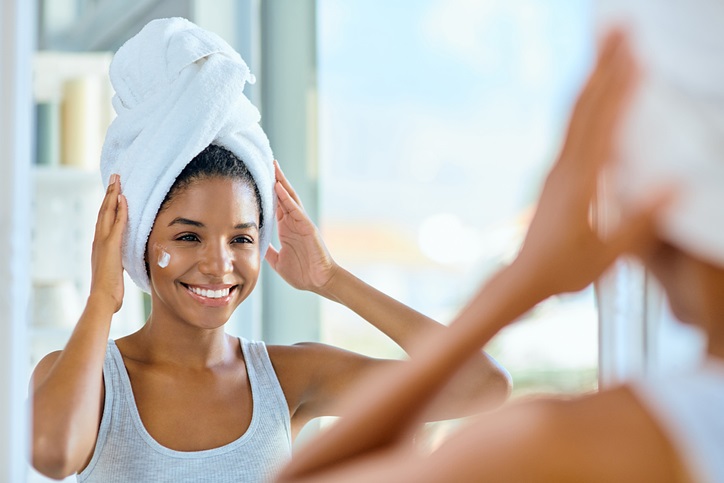
There's always a new trick, shortcut or hack beauty influencers swear by. But some of these can be weird or even dangerous.
While these online and IRL beauty influencers often swear by these unconventional hacks that use common household products on your skin, it’s important to do enough research and know your skin type before testing any beauty hacks you see online.
From using calamine lotion as a primer before applying foundation to moisturizing with petroleum jelly, TRUELOVE spoke to expert dermatologists to find out if these trends are really safe for your skin.
READ MORE | 'Retinol exfoliates the skin', plus 5 other myths about this popular skincare ingredient
Calamine lotion as primer
According to leading makeup brand Maybelline, primer is usually used on your face to help prepare the skin and create an ideal canvas to hold foundation, concealer and other makeup products you apply to the skin.
A new trend which has been making waves in beauty communities on TikTok and Instagram is using calamine lotion or Milk of Magnesia as a primer before applying foundation.
The important thing to note about calamine lotion and Milk of Magnesia is that they are of a basic pH level, while your skin’s pH balance leans towards slightly acidic or neutral, which can cause excessive dryness and ruin the skin’s natural barrier to environmental pollutants.
Dr Nokubonga Khoza, a Durban-based dermatologist specializing in hair, skin, and nails highlights how calamine lotion contains ingredients like zinc oxide, iron oxide, and glycerin, which are often used for anti-inflammatory and antiseptic purposes, but using them daily can have adverse side effects.
“Calamine can dry the skin, cause irritation, a contact dermatitis, skin sensitivity and damage the skin barrier. I would err on the side of caution, in using it every day,” Dr Khoza explains.
Offering some insight into safe products you can use on your skin for a smooth makeup finish, she says, “My [advice] for a flawless make-up finish is gentle cleanser, lightweight moisturizer and, if [it’s] during the day, a lightweight sunscreen, followed by a primer. Moisturisers alone serve as wonderful primers as they plump up the skin cells and give that radiance.”
READ MORE | Experts debunk sunscreen myths - 'Black skin does burn'
Soap for your edges and brows
Another new trend to achieve the laid edges and laminated eyebrows look that has become more and more popular is using bar soaps – sometimes mixed with setting spray – and a brush to gel down the baby hairs on the hairline and to set the brows.
Centurion-based dermatologist Dr Temi Awotedu specialises in aesthetic medicine and encourages people to stay away from using bar soaps and setting lotions or sprays on your edges and brows.
“Both soap and setting lotion are products that should not be allowed to dry on one’s hair or face for any period of time due to irritation,” she explains.
Dr Khoza also reiterates that true soaps often dry the skin and disrupt the skin barrier which can lead to irritation, redness, scaling, flaking, itching, or even hair breakage or brow loss. This is because the average pH of soap is 9 to 10, which is too high to let it sit on the skin, which has a pH level of 4 to 5.
If you’re going to try out this trend, she recommends looking for soaps made up of fats and oils and contain similar ingredients found in moisturisers.
“So, looking for ingredients like glycerin or stearic acid which can protect the outer layer of the skin is my [advice]. Glycerin soap is mild, it’s gentle on the skin and has a neutral pH so [it] will not disrupt the acid mantle of the skin,” Dr Khoza advises.
Slugging with petroleum jelly
The term slugging has increasingly been used in the beauty and skincare community and has been growing in popularity.
Slugging refers to the heavy application of an occlusive agent – which is an oily substance – to act as a barrier and seal moisture into the skin. The most common ingredient people use to slug is petroleum jelly or Vaseline and, along with combatting dry skin, it also helps promote wound healing.
While slugging with Vaseline is a pastime many have grown up with, it’s important to note that it can have different effects on different skin types.
Dr Awotedu and Dr Khoza both emphasise that slugging with petroleum jelly is best used for those prone to very dry skin, lips, nails, and a disrupted skin barrier. If you’re looking for that dewy or glowing effect on your skin and a more youthful appearance, slugging the skin with Vaseline is the way to go.
Make sure you know your skin type first. Slugging is not recommended for people with acne and skin prone to breakouts since it can block the pores further and worsen breakouts.
It’s important to be aware of your skin type before trying out any skincare or beauty trends you might find online, and if you’re not sure whether a product will give you an adverse reaction or not, try a patch test first on the skin behind your ear to make sure you don’t experience any allergic reactions.
Don't miss our top stories, sign up to the TRUELOVE newsletters now!











